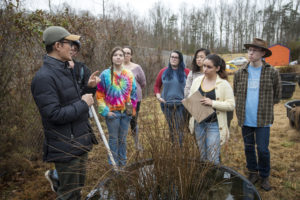
George Mason University has over 125 Green Leaf courses across 25 academic programs. These courses are designated within the Course Catalog. If you believe your course should be designated as a Green Leaf course or if you would like to understand how to incorporate sustainability concepts into your course, please contact the Sustainability Fellow/Coordinator within the Provost’s Office. If you teach a General Education course and utilize examples of sustainability issues, your course can be included with the Mason ENCORE series which provides students with an optional pathway through General Education. There are pathways in sustainability and well-being with co-curricular activities listed in the Patriot Experience. For sustainability, most of the co-curricular activities are listed in the Civic Learning and Community Engagement pathway. At its completion, the students will earn a Mason Core completion certificate with a recognition on their academic transcripts.
Please visit Mason’s course catalog to view the university’s Green Leaf courses.
According to the Association for the Advancement of Sustainability in Higher Education’s STARS rating system:
- Sustainability-focused courses provide valuable grounding in the concepts and principles of sustainability. These courses educate students about how different dimensions of sustainability relate to and support each other in theory and practice. In addition, these courses help equip students with the skills to weave together disparate components of sustainability in addressing complex issues.
- Sustainability-related courses help build knowledge about a component of sustainability (people, planet, and profit) or introduce students to sustainability concepts during part of the course. They may complement sustainability-focused courses by providing students with in-depth knowledge of a particular aspect or dimension of sustainability (such as the natural environment) or by providing a focus area (such as renewable energy) for a student’s sustainability studies, or they may broaden students’ understanding of sustainability from within different disciplines.
